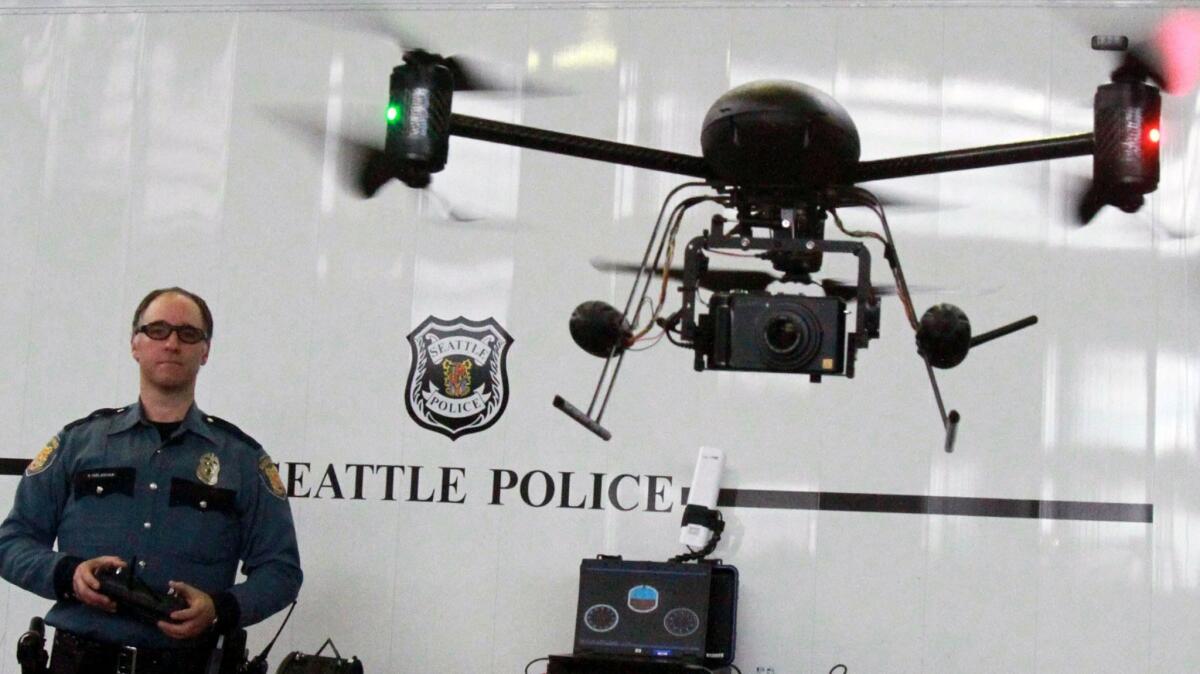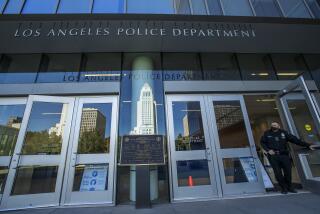Should the LAPD test drones? Police get an earful from the public

As Los Angeles police pitched their plan to fly drones Wednesday night in a series of forums held across the city, the reaction was less positive than they might have hoped.
Dozens of residents expressed concern ranging from skepticism to outright opposition to any use of drones by the Los Angeles Police Department, telling department brass they were worried about their privacy, over-militarization of the police and that the devices would be flown far more than the LAPD has pledged.
“I wish the trust was there,” said one woman at a meeting held near Griffith Park. “I wish that I could say, ‘Oh great, please do it.’ But you guys really need to earn back some trust in the community. It’s not there.”
The LAPD’s proposal to fly drones during a one-year pilot program is still in the early stages — the civilian Police Commission must sign off on the pilot program and a policy for testing the drones before any are flown.
Officials said use of the drones would be limited: standoffs with hostage takers or barricaded suspects, bomb scares and shootings in which a gunman is still targeting people. Department brass have said the devices could help gather crucial information as those incidents evolve without putting officers at risk.
Assistant Chief Beatrice Girmala said this month that if the LAPD was to fly drones, each use would require the approval of a high-ranking officer and would be documented for later review. Girmala stressed that the drones would not be weaponized.
But at community meetings near Griffith Park and in Van Nuys, the proposal drew largely negative responses. Other meetings were held in San Pedro and Westwood.
About two dozen people attended the meeting in Van Nuys, with speaker after speaker saying no to the LAPD’s use of drones. Some expressed fears that the pilot program would be the first step to a “Big Brother” state in which citizens’ movements are tracked by the government.
“I’m not fooled by the image of a cute little unmanned drone,” said Edie Pistolesi, a professor of art at Cal State Northridge and member of Jewish Voice for Peace. “This is the beginning of the police state. Hello, Nazi Germany.”
The LAPD has plenty of high-tech equipment and should focus more on crime prevention and mental health services, said another speaker, Ronnie Veliz.
“You don’t need this help with all the militarization you already have,” said Veliz, 33, director of Somos Familia Valle and a student at Cal State Northridge.
The police are already viewed as an occupying force, and deploying machines instead of humans will further erode their relationships with residents, several speakers said.
The meeting occasionally turned contentious. As Cmdr. Edward Prokop, who leads the LAPD’s counterterrorism and special operations bureau, explained that drones would not raise civil liberties issues because of the way they would be deployed, an audience member shouted: “We don’t believe you.”
At one point, the audience chanted: “Drone-free LAPD. No drones, L.A.”
Another meeting, held in an auditorium near Griffith Park, also drew about two dozen people, including members of the Stop LAPD Spying Coalition. Although one woman said she supported the LAPD’s use of drones — they could be helpful scanning the L.A. River for people during heavy rainstorms, she noted — the rest of the room was wary.
At one point, some critics stood and turned their backs to Girmala, the LAPD assistant chief, as she explained the advantages the LAPD sees in using the devices.
After the meeting, Jerome Courshon, the vice-chair of the Silver Lake Neighborhood Council, acknowledged that Girmala offered some examples where a drone might be useful, but said he was still concerned about public oversight and “mission creep” — that police would quietly expand their use over time.
“I’m skeptical that this is going to be used properly 100% of the time,” he said.
Drones have been hailed by law enforcement across the country as a valuable technology that could help find missing hikers or monitor armed suspects without jeopardizing the safety of officers. But efforts to deploy the unmanned aircraft have frequently drawn fierce criticism from privacy advocates and police critics for whom the devices stir Orwellian visions of inappropriate — or illegal — surveillance and fears of military-grade, weaponized drones patrolling the skies.
The LAPD first obtained the unmanned aircraft three years ago, when Seattle police unloaded a pair of Draganflyer X6 drones that stirred criticism in that city. The controversy accompanied the drones to L.A.; after public outcry here, the devices were locked away and never flown.
The LAPD destroyed the Draganflyers this month, just before the department revealed it wanted to test different drones as part of the pilot program.
Critics, though, have raised concerns that the LAPD could use the drones to surveil innocent people, lawful protesters or residents in minority communities.
“Whenever we hear that a government agency, especially police, is interested in acquiring drones, we have lots and lots of concerns,” said Adam Schwartz, a senior lawyer with the San Francisco-based Electronic Frontier Foundation. “If they went forward with it, there needs to be a great deal of safeguards and restraint.”
Those safeguards, Schwartz said, would include a policy specifying the exact situations when the devices could be flown and requiring a high-ranking officer to deploy them. There should also be some sort of paper trail so the public can see when the drones are flown, he said.
Although public feedback and Police Commission approval are good, Schwartz added, getting the City Council to consent to any use of drones by the LAPD “is better.”
The timing of Wednesday’s meetings was criticized by some residents and advocacy groups. The Stop LAPD Spying Coalition, which has been among the most vocal, sent a letter to Mayor Eric Garcetti on Tuesday, accusing the LAPD of failing to alert the public about the meetings in a timely manner. The group also took issue with the fact that none of the meetings were held in the southern or eastern areas of L.A. or downtown.
“We demanded that these meetings be canceled and rescheduled,” the group wrote.
The American Civil Liberties Union of Southern California echoed those concerns, emailing supporters a letter urging them to “tell the L.A. Police Commission: no to drones -- at least until our community has had a fair chance to ask the questions important to them.”
Before the forum held near Griffith Park, Girmala noted that information about the meetings was posted on the LAPD’s website and distributed to the media. Residents who weren’t able to attend the meetings can still weigh in by mailing a letter or sending an email to the LAPD, she added.
UPDATES:
10:05 p.m.: This article was updated with details from the community forums.
This article was originally published at 5 a.m.
More to Read
Sign up for Essential California
The most important California stories and recommendations in your inbox every morning.
You may occasionally receive promotional content from the Los Angeles Times.












